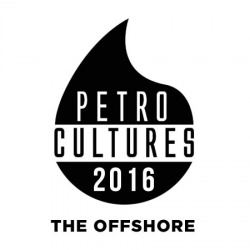Petrocultures International Conference

Combining academic presentations with public lectures, community roundtables, and public film screenings, the conference is of interest to anyone keen to think more about our relationships to oil and energy. Registration is open, all are welcome and more details are available at the conference website.
Approximately a third of all oil and gas production takes place offshore, and this proportion is continually increasing as companies push into ever deeper and more remote locations. Oil is sought and extracted from the Arctic Ocean to the South China Sea, from Bass Strait to the Niger Delta. In addition, oil is a key commodity of seaborne trade. According to recent UN Conference on Trade and Development statistics, nearly three billion metric tons of crude oil, gas, and petroleum products are shipped annually worldwide.
Despite the fact our economies and lifestyles depend so heavily on the oil industry, much of the work and infrastructure associated with it, to say nothing of the deposits themselves, are situated out of plain sight. This relative invisibility makes the cultural imaginaries of oil, particularly deepwater offshore oil, highly powerful. Petrocultures 2016: The Offshore is an important forum for examining such figurations, including how they relate to framings of alternative forms of energy, such as wind and tidal power.
Newfoundland and Labrador is an excellent location from which to contemplate petrocultural matters. The Canadian province is highly dependent on its offshore oil industry, and prone to the ongoing social and economic instability that typically accompanies such reliance. In addition, the province has a long and fraught history of hydro-electric power development. Given Newfoundland and Labrador’s North Atlantic geographic and geological contexts, there are also especially illuminating parallels to be drawn between its experience and that of other offshore oil-producing places in the region, such as Ireland, Scotland, and Norway.Petrocultures 2016 brings together scholars, policy-makers, industry employees, artists, and public advocacy groups from across North America and beyond.